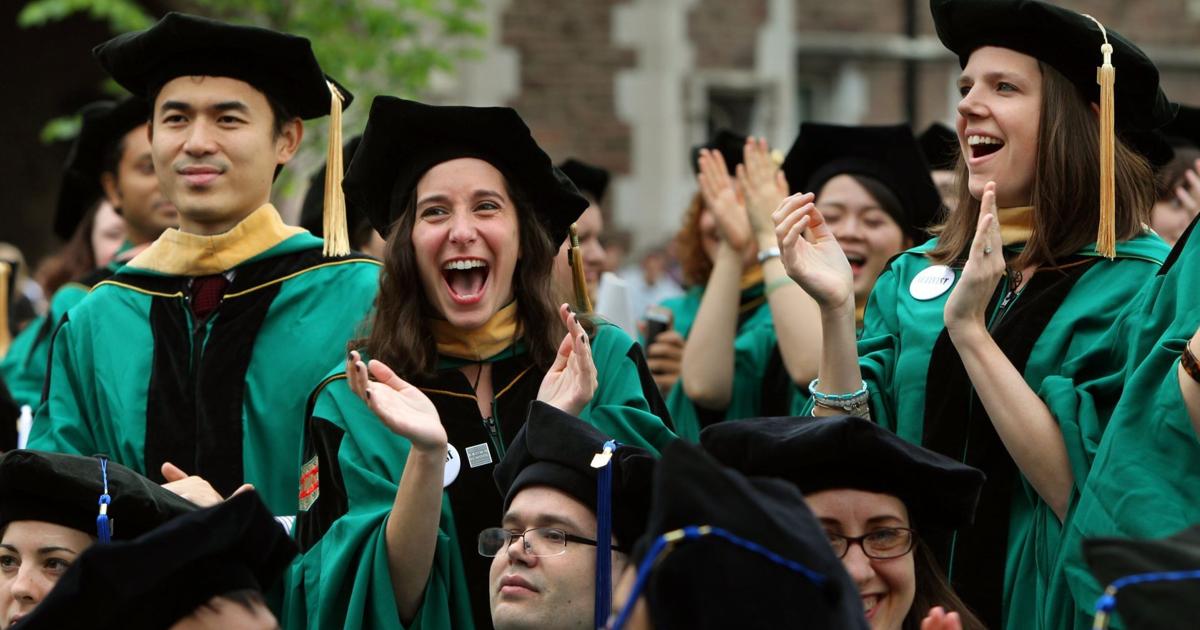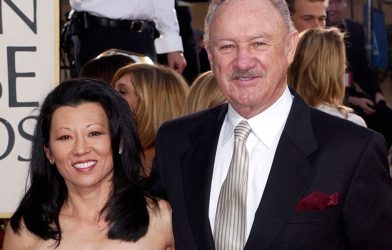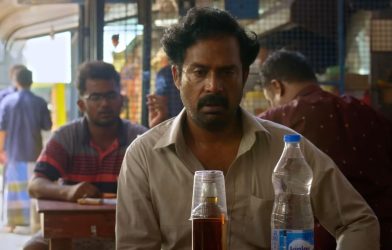It’s a time for joy. A time for tears. A time to treasure through the years.
Graduation day is a day we’ll always remember. And for thousands of area teens and young adults, the day of their graduation from high school and college is shockingly close at hand.
Students in some schools, including Maryville, Lindenwood and Missouri Baptist Universities, have already had their graduation. Others will have their ceremonies as early as this weekend.
At St. Louis University, they’re looking forward to a commencement speech by A-lister Jon Hamm. At Washington University, they are awaiting a speech by comedic character actor Jennifer Coolidge.
Graduation is a time to look ahead with anticipation, to face the great unknown. But it is also a time to look back and reflect on experiences of the last few years.
People are also reading…
It is in this spirit of reflection that we present a non-definitive list of some of our favorite graduation-based movies, songs and books.

In this photo provided by MGM, Dustin Hoffman looks over the stockinged leg of actress Anne Bancroft, his seductress in this scene from the 1967 film “The Graduate.” (AP Photo)
“The Graduate,” 1967, directed by Mike Nichols: Yes, we know the entirety of this movie takes place after graduation. But no other film so accurately depicts the uncertainty of some graduates about to face the world.
Dustin Hoffman stars as Benjamin Braddock, who is Hamlet-like in his inability to make a decision about his future. He drifts into an affair with a married woman (Anne Bancroft) while inconveniently falling in love with her daughter, played by Katharine Ross.
It’s a masterful piece of filmmaking that captures the anti-establishment, anti-parent spirit of the 1960s perhaps better than any other. The whole essence of the time is encapsulated in a single word: “Plastics.”
Fun fact: The scene in which Bancroft puffs on a cigarette just before Hoffman kisses her, and exhales a cloud of smoke when the kiss is over, is a recycled bit from a routine the director Nichols used to do with his comedy partner Elaine May.

In this film publicity image released by Warner Bros. Pictures,
Ryan Gosling, left, and Emma Stone are shown in a scene from
“Crazy, Stupid, Love.” (AP Photo/Warner Bros. Pictures, Ben
Glass)
“Crazy, Stupid Love,” 2011, directed by Glenn Ficarra and John Requa: It may be the funniest film of the 21st century, so far. And the climactic scene is a high school graduation.
Steve Carrell stars as a bland but sympathetic man whose milquetoast ways have caused him to lose the love of his wife (Julianne Moore) and the respect of his children. The sometimes questionable advice of Ryan Gosling helps to unmilquetoastify him, leading to a graduation at which he must embarrass himself publicly to prove his love and affection for his son.
The whole public-debasement-for-personal-redemption trope has been done a hundred times, from “Little Miss Sunshine” (also involving Steve Carrell) to “Notting Hill.” But “Crazy, Stupid Love” stands out because Marisa Tomei is in the audience, and she hilariously plays a vindictive woman who wanted a past casual encounter with Carrell to be more than casual.

“I Love You, Beth Cooper,” by Larry Doyle: We’re talking about the 2007 book here, not the 2009 movie made from it. We’re absolutely not talking about the movie.
The story begins at high school graduation, where the nerdy and inexperienced class valedictorian publicly announces his love for the most desirable girl in class — who barely knows his name.
That act sets off a night of adventure, discovery (the girl of his dreams is just as flawed as he is, though in different ways) and a lot of physical pain.
It’s ferociously funny. There is a laugh-out-line — or two — on every page, as the characters essentially grow up as evening turns to morning.
“Graduation Day,” 1956, the Four Freshmen: Yes, it’s sappy. Yes, it’s treacly. Yes, we quoted the first three lines, and sort of the fourth, in the introduction to this story.
But it’s the ultimate expression of all the mixed emotions that are brought up when leaving behind the known world of school and facing a bright but mysterious future.
“Though we leave in sorrow/All the joys we’ve known/We can face tomorrow/Knowing we’ll never walk alone” That kind of says it all.
Also, does anyone else think it’s funny that a song about graduation is sung by the Four Freshmen? Shouldn’t it be the Four Seniors?
“Bright College Days,” 1953, Tom Lehrer: This song came out three years before “Graduation Day,” but it is very much a parody of songs like it.
A bright and perky melody underscores such cheeky lyrics as “Let’s drink a toast as each of us recalls/Ivy-covered professors/In ivy-covered halls” and “Soon we’ll be out amid the cold world’s strife/Soon we’ll be sliding down the razor-blade of life.”
In several lines, the Harvard-educated Lehrer specifically makes fun of Yale University’s beloved “The Whiffenpoof Song.” “We will sleep through all the lectures/And cheat on the exams,” he sings, “And we’ll pass and be forgotten with the rest.”

Reese Witherspoon in “Legally Blonde”
“Legally Blonde,” 2001, directed by Robert Luketic: This is the prototypical graduation scene. Reese Witherspoon delivers a commencement speech for Harvard Law School that is both hopeful and reflective, but also nicely sums up the film’s themes.
“It is with passion, courage of conviction and strong sense of self that we take our next steps into the world,” she says, listing the characteristics in the story that took her from social outcast to the most-respected student in the school.
“You must always have faith in people. And most importantly, you must always have faith in yourself.”
Coolidge, the Washington University commencement speaker, has a memorable role in the film as a sweet-natured manicurist who befriends Witherspoon’s character.

Lauren Graham (left) and Alexis Bledel (right) star in “Gilmore Girls.” At the end of the show’s third season, Bledel’s character, Rory, gives a memorable high school graduation speech.
“Gilmore Girls,” 2003, directed by Jamie Babbit” It’s a common directors’ trick: By showing characters start to cry at an emotional scene, that gives the audience license to cry, too. This episode builds on that idea by having characters specifically talk about how they are not going to cry just before Alexis Bledel gives her high school valedictory speech. The speech, of course, makes them cry.
It’s a speech worth crying over.
Longer than most filmed graduation speeches, it is in three heartwarming parts. In the first part, Bledel talks about the books she read in class that have influenced her so strongly — “Moby Dick” and “Huckleberry Finn” and “Anna Karenina” and “Swann’s Way” among them. (That must be some high school that teaches Tolstoy and Proust.)
Next, and with impeccable grammar, she thanks her grandparents (“They are my twin pillars, without whom I could not stand”). And finally she thanks her mother (“My mother never gave me any idea that I couldn’t do whatever I wanted to do or be whomever I wanted to be. … As she guided me through these incredible eighteen years, I don’t know if she ever realized that the person I most wanted to be was her”).
“Graduation (Friends Forever),” 1999, Vitamin C: Pop singer Vitamin C co-wrote the song with Josh Deutsch, but the melody is by Johann Pachelbel. It’s the popular Canon in D, which is now heard at many weddings and some funerals.
It turns out to be perfect for graduations, too, at least when paired with appropriate lyrics. The chorus goes “As we go on, we remember/All the times we had together./And as our lives change, come whatever/We will still be friends forever.”
The song goes on to question what the singer and her friends will be like as adults and whether they will stay the same as they were in high school. Vitamin C was 30 when the song came out, so she already knew the answers.
“West Point,” 1927, directed by Edward Sedgwick: A star of silent films and early talkies, William Haines specialized in stories of likable, charismatic young men, usually college students, whose ego eventually leads them to be shunned by their colleagues and girlfriends.
At the stories’ end, his character always realizes the error of his way, does something suitably heroic and regains the affection of his friends and his girl.
The pictures were enormously successful, and none was better than the silent “West Point.” Set, as the title suggests, at the United States Military Academy at West Point, the movie was filmed there, too, which added a thrilling layer of verisimilitude for the 1927 audiences.
Most of the story involves the football team, for which Haines is a star before he becomes an outcast. But the concluding graduation scene uses the real West Point graduation parade, which is impressive and kind of stirring to see.
“Graduation Day,” 1981, directed by Herb Freed: In the early 1980s, filmmakers turned anything they could think of into an excuse for a slasher film.
“Graduation Day” was an early entry into the slasher-film ranks, and it was similar to all the others: cheesy, cheaply made, poorly acted and not very bright.
Someone is killing members of a high school track team just before graduation. Every main character, and some minor ones, is a suspect. The killer, apparently picked at random, turns out to be the boyfriend of a student who died just after a race. We’re only telling you this to try to dissuade you from watching the movie.
Some of these slasher films kickstarted fairly significant careers. Johnny Depp was in “A Nightmare on Elm Street.” Kevin Bacon was in “Friday the 13th.” Jamie Lee Curtis was the star of the original slasher film, “Halloween.”
“Graduation Day” features an early appearance by Vanna White as one of the students. Her character is not killed, but she does stumble upon one of the corpses.

Now a staple at every graduation, “Pomp and Circumstance“ was originally composed for the coronation of King Edward VII in 1901.
“Pomp & Circumstance March No. 1,” 1901, by Edward Elgar — “Pomp & Circumstance” was composed in 1901 and first performed at at graduation in 1905.
Whatever did people do at graduations before that?

Jon Hamm and Jennifer Coolidge
According to the National Student Clearinghouse, college enrollment has decreased 8% since 2019. However, it’s not due to a lack of a learning desire among students, it’s instead a way to avoid the sometimes massive amounts of college debt that could be waiting for them down the road.The number of kids enrolling in college is down, but the number of kids enrolling in trade programs is up. Mechanics saw enrollment increase by 11.5% since 2019. Other programs like construction have seen increases as high as 19.5%. Students say it’s because they are enjoying the hands-on learning approach of what these programs offer them.”I’ve always been more of a hands-on learner and with welding everything is hands on. You’re always doing something. It starts with getting certified through high school. And coming in another two months I’ll take a certification test. Get that and hopefully enroll in a CSCT as soon as possible,” said Noah Hernandez, a student. Companies are getting on board with this trend as well. Just last week, on Thursday, Walmart announced it is cutting back the number of degrees it offers workers, instead they are offering workers a chance at earning trade certificates. The company announced it hopes to hire 100,000 new workers through this method over the next three years.According to Georgetown University, students who work in the workforce but do not get a four-year college degree can earn up to 75% less than their college graduate counterparts, but students say the savings that they are not getting by not having student debt outweighs the disparity in pay.SEE MORE: Biden administration announces $1.2 billion in new student debt relief









